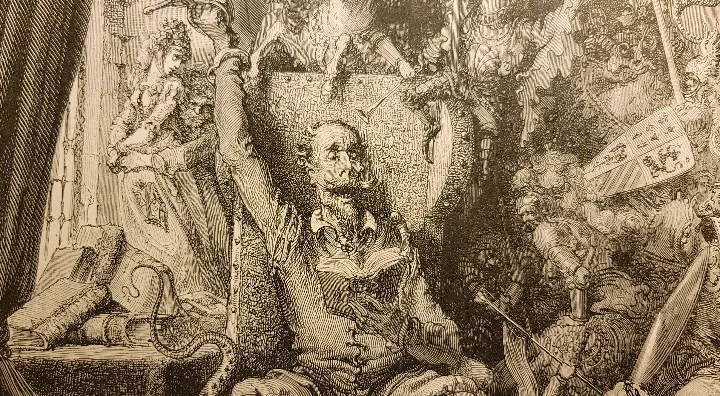The Ghost of Cervantes (Essay)
I had a dream about my brother. He had borrowed my copy of Ulysses by James Joyce, had finished reading it, and was returning it to me. At least it appeared as if it was my copy, as I have little coloured tabs that I placed to mark the chapters (given that the book is cheekily unhelpful in this regard), yet on closer inspection the book before me was tabbed in different ways indicating the book was, in fact, my brother’s own copy. A minor detail, but it reinforced to me, within the dream, his investment into the venture of reading literature.
Rarely for me, it was a good dream, as I felt a great pride in my brother for having focussed and completed such a daunting task, as reading that book can be a great challenge. It was for me, but the result from reading it was that my entire perception of how the written word can be expressed was changed, and it fuelled the first spasm of free verse that I now call my first poem. Thus, making the effort to read that monolith expanded my creative mind and had a positive impact on my writing abilities.
This dream I had was no doubt spurred by a conversation I had had with my brother some months ago in which he told me he wanted to start reading again, and, as he knew I had been reading much in recent years, asked me for some book recommendations.
A request like this fired all sorts of considerations in my mind. My brother is essentially an extraverted and higher IQ version of myself, giving him the quick wit of a comedian yet lacking, perhaps, whatever ability for introspection into the nature of feeling I have, meaning many of my treasured novels such as Anna Karenina or Les Misérables may not be ideal for him. I am ashamed to also admit that my first thought was: “why should I bother when I know he will not commit to the task?” You will find out why later I had such a lack of faith.
I did tentatively suggest Don Quixote by Cervantes, thinking the satire may appeal to him, although this raised further considerations that occurred to me while I was explaining to my brother the object of Cervantes’ satirical derision, namely chivalric romance, for it can be seen as a direct assault on the entire mode of entertainment that my brother consumes.
Chivalric romance may seem the most distant genre from our modern canon, yet is, as many have remarked, just as prevalent as ever. The majority of movies, books or video games belonging to genres such as fantasy, action, thriller, horror, science fiction are born out of the tradition of the chivalric romance of the middle ages and it was Cervantes, more than any one, that destroyed the credibility of this tradition. The idea of a single exemplary hero, or group thereof,...
Rarely for me, it was a good dream, as I felt a great pride in my brother for having focussed and completed such a daunting task, as reading that book can be a great challenge. It was for me, but the result from reading it was that my entire perception of how the written word can be expressed was changed, and it fuelled the first spasm of free verse that I now call my first poem. Thus, making the effort to read that monolith expanded my creative mind and had a positive impact on my writing abilities.
This dream I had was no doubt spurred by a conversation I had had with my brother some months ago in which he told me he wanted to start reading again, and, as he knew I had been reading much in recent years, asked me for some book recommendations.
A request like this fired all sorts of considerations in my mind. My brother is essentially an extraverted and higher IQ version of myself, giving him the quick wit of a comedian yet lacking, perhaps, whatever ability for introspection into the nature of feeling I have, meaning many of my treasured novels such as Anna Karenina or Les Misérables may not be ideal for him. I am ashamed to also admit that my first thought was: “why should I bother when I know he will not commit to the task?” You will find out why later I had such a lack of faith.
I did tentatively suggest Don Quixote by Cervantes, thinking the satire may appeal to him, although this raised further considerations that occurred to me while I was explaining to my brother the object of Cervantes’ satirical derision, namely chivalric romance, for it can be seen as a direct assault on the entire mode of entertainment that my brother consumes.
Chivalric romance may seem the most distant genre from our modern canon, yet is, as many have remarked, just as prevalent as ever. The majority of movies, books or video games belonging to genres such as fantasy, action, thriller, horror, science fiction are born out of the tradition of the chivalric romance of the middle ages and it was Cervantes, more than any one, that destroyed the credibility of this tradition. The idea of a single exemplary hero, or group thereof,...




